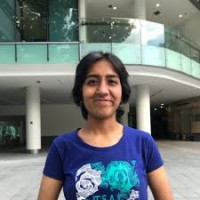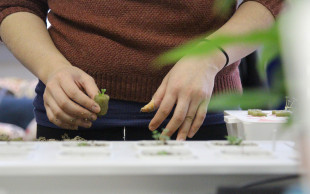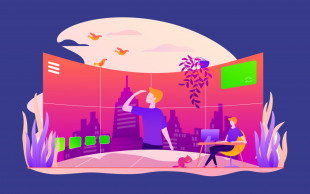Image Credit: Pooja Nansi
“So today is Thursday. Is it Thursday? It's been four days since the festival?!” Pooja Nansi responds incredulously when I ask her how she’s recovering from Other Tongues, “Clearly I haven't really had time to process this.”
Other Tongues was an empowering celebration of otherwise silenced voices. It cultivated dialogue, understanding and inclusion across all minorities: lingual, racial and sexual. We were blessed with its first edition on 7 and 8 December to which participants and speakers responded with only positive things.
“The words that keep coming to me on social media posts have been very healing and affirming. We saw really good attendance for most panel discussions. Some events were obviously more targeted like the Emerging Eurasian Voices panel which was quite specifically created to address certain communities but even that had a strength of about thirty which is great for a Saturday evening and I'm very happy that people came to listen.”
This Youth Poet Ambassador (YPA) festival is a culmination of work Pooja has been working on since the beginning of her tenure. When asked about the genesis of this undertaking, she thinks back to 2016, when she did her one woman piece, ‘You Are Here’, which was rooted in her sense of immigrant identity:
“I was wondering about who I was writing that [You Are Here] for; who it was speaking to. And then I found myself going to a lot of Malay theatre and realizing that they’re saying some of the same things I was saying. I was very lonely writing as a minority because I didn’t really have communities to have conversations in. The first time I felt, weirdly, that I had the community in which those specific issues were understood, was when I was in London.”
The spaces she visited in London were brimming with minority kids at spoken word events coming from all backgrounds, because spoken word doesn’t really require you to have a super formal knowledge of poetry. “You’re not trying to freaking write a sonnet, and even if you are, (I’m not saying spoken word artists don’t write sonnets, they do) there is a lot more flexibility.”
"When you watch someone speaking to their truth and it lands on you - that moment can be a very powerful transformation" ~ Pooja Nansi
She then reached out to a collective called Octavia, which is specifically for women of color. Everyone was hosting multitudinous conversations using their vernacular tongues and talking the way they talk, in a poem. “I was talking to Shridar about it and he was like: it’s probably insane but we should try to create a space like that,” Pooja laughs. “I realized that the YPA platform was a really good space to do it because that platform is intended to give voice to younger poets. I think I’m proudest that my lineup had very young poets who have otherwise only performed in very small events once or twice. They were phenomenal!”
When asked how her experience as a minority writer informed her curation of artists, she replied, “My experience as a minority writer is very different from yours, for example, and is not like anyone else's. We have to understand that “minority” is not a monolith - we can't just say that we all have the same struggle. What we do have in common is the need to see ourselves and our stories represented. I was very careful to find people who do not appear as much in the mainstream literary space or young writers slipping across borderlines, doing very exciting work and I wanted to put them next to more experienced writers, Alfian Sa’at or Bali Kaur Jaswal, for example. It is so important to have access to someone who has faced challenges that you do on a daily basis and look at what they’ve become. I didn’t have that when I was younger.”
Now, the YPA festival might mislead some into thinking that the two days were packed with formal panels and poetry readings in a very academic setting, but those who went know that it is far from the truth. Pooja wanted to explore poetry broadly, to give access points to people who wouldn’t otherwise come to a poetry reading:
“You can’t say some writing is not poetry when you have Kendrick winning the Pulitzer. On the day after the opening spoken word poetry night I met a girl who came to Alfian Saat’s workshop and she said she’d never been to a poetry reading like that. I asked her what she meant by like that. She told me that a lot of the times when she goes to poetry readings, people are just standing there, reading off the page. I come from a spoken word background where people tell you it is not serious poetry so I have to keep reminding myself that there are people who need to see how much of a living, breathing, current thing it can be. When you watch someone speaking to their truth and it lands on you - that moment can be a very powerful transformation.”
Her favourite thing in the festival, for example, was the low reverberating “hmm” that descended across the whole room each time someone said something profound that people from all ethnicities connected to.
“That is something I hear a lot during poetry nights but rarely in panels. To be fair, that sound of affirmation, the sound of: we all go through that, don’t we? gave a real sense of community.” ~ Pooja Nansi
I tell her I remember how the girls up front would start clicking their fingers each time one of the panelists said something savage. “Absolutely.” Pooja nods. “The Letters To Otherness panel was very beautiful just in what it unearthed. It was very important to me to have queer representation and the panelists were supremely courageous to just stand up there and just talk about their stories.”
She adds that the Writer’s Karaoke at the Projector was another (weirdly) exciting, hybrid thing she wanted to do, but had never tried before. The weekend had been brimming with heavy and very important discussions, which continued when people shared their pieces about representation, but a party was needed to conclude the whole thing.
“We thought, this is either going to be loads of fun or it’s going to be a super hot mess. It turned out to be loads of fun and a super hot mess. It's just something about music that moves you. I think that format was one of my favorite things from that festival.”
Other Tongues, however, had to be limited to being only text based, which helped streamline its focus. Initially, since the Projector was a venue partner, there was some indecisiveness regarding whether or not to incorporate film as a format. “Maybe next time,” she shrugs.
To which I promptly ask, “So there will be a next time?”
“I mean..” She starts. “I can't promise it. We hope to, but it’s also just finished. I do think it's important to keep the momentum going with what has happened with Other Tongues. It definitely feels like it has opened some doors, but that doesn't mean that I have to carry these communities forward. Even if new artistic work emerges as a result of people meeting each other during the festival, our objective will be reached. It’s really weird because the day after the festival ended, we were all on the group chat talking about all the things we should do, but I guess for now, we're all going to have to take a break and come back to it next year.”
Singapore already has several festivals that address each minorities’ respective cultural arts and voices. A lot of the time, the struggles we face as writers/artists are very similar. Other Tongues is unique because it facilitates conversations across minorities, and not just within them, which was in sync with the discovery of a common thread connecting You Are Here to Malay theatre.
I ask her what she thinks of hosting individual festivals: “You [Singapore] talk about multiculturalism but actually you’re kind of just...here, Malay people have your festival or here, Indian people have your festival."
"I hate the CMIO model. It’s not reflective of Singapore anymore because we have Filipino and Bangladeshi voices, for example, that are very much a part of the fabric of Singapore." ~ Pooja Nansi
"The English scene has so much tokenism happening; people scrambling to, I think things have gotten better now but, there was a time when I was literally being called to be on many panels because people needed to not have an all-chinese or an all-malay panel.”
I remember the The What We Talk About When We Don’t Talk About Race panel, which took place during a late afternoon at Sing Lit Station. It had three decades of writers, but they were talking about the same problems. Nothing has changed. At one point, one of the speakers, Bali Kaur Jaswal, threw her hands up when asked about how racism has reduced. “It hasn’t,” she said, “Only the ways to show racism have changed.”
I admit to Pooja that I don’t quite feel the need to talk about race in my works. She starts to not as if she is familiar with the sentiment, which is a response I did not anticipate. She starts to tell me how she started out like that, how people would ask her to be on South East Asian Women panels and she’d get really annoyed because she didn’t necessarily write about things that were Indian:
“It’s very interesting to me because a lot of young minority writers say they don’t feel the need to write about race. And I tell them: I’ll ask you again in ten years. If you’ve read ‘Love is an Empty Barstool’, it’s just love poems. Nothing about race. It was only when I started functioning in literary spaces that I realised how brown and female I was because they were very Chinese and very male. I’ve never felt more brown. I realized that I can homogenize myself but they’re not gonna homogenise me. That’s when something switched in me. And a lot of times, I meet older writers and they tell me the same: they never thought of their work as racially charged till they were made to realize that they were different.”
Pooja’s Youth Poet Ambassador tenure has officially ended. She had used very little funding for other programmes during her tenure, which means that most of it was left for Other Tongues, 2018. This platform saw minorities coming together, forming writing collectives, forging friendships, and learning from each other in ways that informed their personal and artistic identities. “It is always easier to host something second time around,” Pooja says. 2019 has begun. We have our fingers crossed.

















